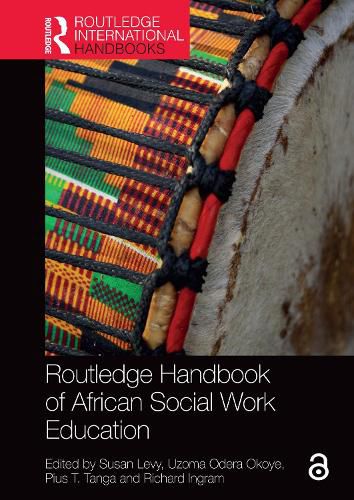Readings Newsletter
Become a Readings Member to make your shopping experience even easier.
Sign in or sign up for free!
You’re not far away from qualifying for FREE standard shipping within Australia
You’ve qualified for FREE standard shipping within Australia
The cart is loading…






This timely Routledge Handbook creates a much-needed space to explore what makes social work uniquely African, as well as shaping, informing, and influencing a new culturally relevant era of social work. The specific focus on social work education offers approaches to transition away from the hegemony of Western literature, knowledge, and practice models underpinning African social work education. The authors identify what is relevant and meaningful to inform, influence, and reconceptualise culturally relevant social work curriculum.
Covering Botswana, Cameroon, Ethiopia, Ghana, Guinea, Kenya, Malawi, Nigeria, South Africa, Tanzania, Uganda, Zambia, and Zimbabwe, the Handbook comprises both empirical and conceptual chapters, multiple approaches, case studies, and key debates on social work education. It is structured in four parts:
Approaches to Indigenising, Decolonising and Developing Culturally Relevant Social Work Education
Social Work Education: Evolution across Contexts
Embedding Field Practicum into Social Work Education
Knowledge Exchange between the Global South and Global North.
The range of indigenous, local knowledge that the Handbook presents is crucial to social work evolving and facilitating for reciprocal learning and knowledge exchange between the Global South and Global North. Whilst the context of the Handbook is Africa, the topics covered are relevant to a global audience engaged in social justice work across social work, social welfare, social development, and sustainability.
$9.00 standard shipping within Australia
FREE standard shipping within Australia for orders over $100.00
Express & International shipping calculated at checkout
This timely Routledge Handbook creates a much-needed space to explore what makes social work uniquely African, as well as shaping, informing, and influencing a new culturally relevant era of social work. The specific focus on social work education offers approaches to transition away from the hegemony of Western literature, knowledge, and practice models underpinning African social work education. The authors identify what is relevant and meaningful to inform, influence, and reconceptualise culturally relevant social work curriculum.
Covering Botswana, Cameroon, Ethiopia, Ghana, Guinea, Kenya, Malawi, Nigeria, South Africa, Tanzania, Uganda, Zambia, and Zimbabwe, the Handbook comprises both empirical and conceptual chapters, multiple approaches, case studies, and key debates on social work education. It is structured in four parts:
Approaches to Indigenising, Decolonising and Developing Culturally Relevant Social Work Education
Social Work Education: Evolution across Contexts
Embedding Field Practicum into Social Work Education
Knowledge Exchange between the Global South and Global North.
The range of indigenous, local knowledge that the Handbook presents is crucial to social work evolving and facilitating for reciprocal learning and knowledge exchange between the Global South and Global North. Whilst the context of the Handbook is Africa, the topics covered are relevant to a global audience engaged in social justice work across social work, social welfare, social development, and sustainability.